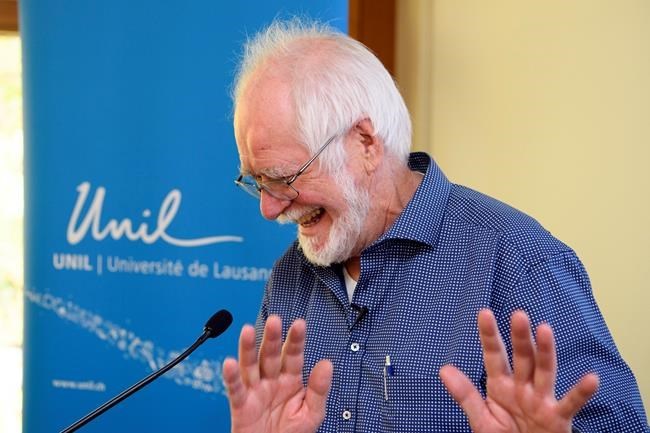
Jacques Dubochet, University of Lausanne, one of the 2017 Nobel Prize winners in Chemistry jokes prior to a press conference at the University of Lausanne, Unil, in Lausanne, Switzerland, Wednesday, Oct. 4, 2017. Three researchers based in the U.S., U.K. and Switzerland won the Nobel Prize in Chemistry on Wednesday for developments in electron microscopy. The 9-million-kronor ($1.1 million) prize is shared by Jacques Dubochet of the University of Lausanne, Joachim Frank at New York's Columbia University and Richard Henderson of MRC Laboratory of Molecular Biology in Cambridge, Britain. (Jean-Christophe Bott/Keystone via AP)
Republished October 04, 2017 - 5:23 AM
Original Publication Date October 04, 2017 - 3:11 AM
STOCKHOLM - The Latest on the Nobel Chemistry Prize (all times local):
2 p.m.
The president of the American Chemical Society says the microscope imaging technique honoured by this year's Nobel Chemistry Prize is like Google Earth for molecules.
"This discovery allows the scientist to zoom in down to the fine detail (which) gives you a wealth of information about that protein molecule and how it's interacting with its environment," Allison A. Campbell told The Associated Press on Wednesday.
Potential payoffs include help in developing medicines and industrial chemicals, she said. But not right away.
"I think it's something for the future," Campbell said. "I think this is a technique that is just starting to find its way into the research community."
The Nobel committee announced Wednesday three scientists share the Chemistry Prize for the technology, called cryo-electron microscopy.
___
12:15 p.m.
Joachim Frank, who shares this year's Nobel Chemistry Prize with two other researchers for developing a method to generate three-dimensional images of the molecules of life, says the potential use of the method is "immense."
Speaking by phone, Frank told a news conference after the Nobel announcement Wednesday that the method, called cryo-electron microscopy, meant medicine no longer focuses on organs but "looks at the processes in the cell."
Frank, based at New York's Columbia University, shares the prize with Jacques Dubochet of the University of Lausanne and Richard Henderson of MRC Laboratory of Molecular Biology in Cambridge, Britain.
The Nobel committee said their technology "has taken biochemistry into a new era."
___
12 noon
Three researchers based in the U.S., U.K. and Switzerland have won the Nobel Prize in Chemistry for developments in electron microscopy.
The 9-million-kronor ($1.1 million) prize is shared by Jacques Dubochet of the University of Lausanne, Joachim Frank at New York's Columbia University and Richard Henderson of MRC Laboratory of Molecular Biology in Cambridge, Britain.
The Swedish Royal Academy of Sciences said Wednesday their method, called cryo-electron microscopy, allows researchers to "freeze biomolecules" mid-movement and visualize processes they have never previously seen."
The development, it said, "is decisive for both the basic understanding of life's chemistry and for the development of pharmaceuticals."
___
7:40 a.m.
The Nobel Prize for Chemistry rewards researchers for major advances in studying the infinitesimal bits of material that are the building blocks of life.
Recent prizes have gone to scientists who developed molecular "machines" — molecules with controllable motions — and who mapped how cells repair damaged DNA, leading to improved cancer treatments.
The 2017 prize, worth 9 million kronor ($1.1 million), is being announced Wednesday by the Royal Swedish Academy of Sciences.
It's the third Nobel announced this week.
The medicine prize went to three Americans studying circadian rhythms: Jeffrey C. Hall, Michael Rosbash and Michael W. Young. The physics prize went to Rainer Weiss, Barry Barish and Kip Thorne for detecting gravitational waves.
The literature winner will be named Thursday and the peace prize will be announced Friday.
News from © The Associated Press, 2017